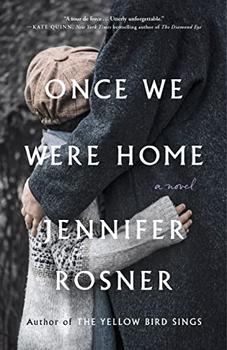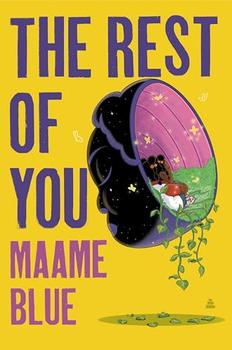Write your own review!
Jean B. (Naples, FL)
A novel to treasure
Beautiful, beautiful prose...this book is a treasure. The author credits her readers with the ability to follow a complicated plot as she tells the story of children displaced and stolen after WWII. She puts readers into the hearts and minds of children being indoctrinated by well-meaning religious persons. This a book to read and re-read, feeling privileged and impressed each time by the beauty of the writing.
Gail K. (Saratoga Springs, NY)
A very satisfying read
Novels that are set during and immediately after WWII are always among my favorites. I was eager to read this story that focuses on children who were removed from their families during the war, ostensibly for their safety. However, Once We Were Home is so much more. At the heart of this novel is the concept of home, what makes a true home and the longing for home. I found the characters to be well-drawn and sympathetic. Although the chapters alternate among the four characters, their stories are individually absorbing and easy to follow. As the novel progressed, I found myself reading more and more intensely to discover the fate of each child. This was a great read for me and a book I will recommend to my book group and my other historical fiction-loving friends. (P. S. I loved the way Jennifer Rosner was able to revisit one of the main characters from her book, The Yellow Bird Sings in this work!)
Toheed
Once We Were Home by Jennifer Rosner
Jennifer Rosner’s Once We Were Home is a powerful and emotional story of a Jewish family struggling to survive the Holocaust. The story follows the journey of the main character, Lillia, as she and her family are forced to flee their home in Poland and seek refuge in other countries. The novel is an exploration of loss, resilience, and hope as Lillia searches for a place where she can feel safe and at home again. Through vivid imagery and engaging characters, Rosner paints a heartbreaking picture of what it means to lose everything you’ve ever known while still holding onto hope for a better future.
Kelly S. York County Library SC
A lot to think about
I enjoy reading historical fiction and this fact based novel was particularly interesting to me because I wasn't that familiar with this aspect of WWII. There is a lot written about the legacy of death and destruction but not so much about the survivors. It inspires more research.
Ultimately, it's about the importance of identity and the need for belonging. It's told primarily through the eyes of four main characters over the course of many post war years. The narrative switches back and forth between time and place telling multiple stories, but Rosner does a wonderful job of making it easy to follow. I really love the way she depicts the various ways individuals adapt and adjust to ever changing situations and to each other.
There are also numerous secondary characters I think equally as compelling. You can feel the anguish of decisions made with good intentions and later regretted, or the self-righteousness in others.
This book was full of lovely imagery an metaphor. I will be recommending this to our patrons.
Laurette A. (Rome, NY)
What is home?
What is home? What does it mean to "be home?" It's more than a physical place, as the novel "Once We Were Home" explains very well. Through the children Roger, Ana, Oskar and Renata and spanning the years 1946-1968 we experience "home" through their eyes and experiences and learn that home can also be a deep feeling of belonging somewhere with those you love, even if they are not your biological family. Based on true stories of children stolen and displaced in the wake of WWII this novel is moving and thought provoking. I enjoyed it and recommend it to book clubs and individual readers.
 Lani S. (Narberth, PA)
History that needs to be told
Lani S. (Narberth, PA)
History that needs to be told
Two Jewish children were raised by a Christian couple, went to church, and were assimilated into the Christian faith but were surrounded by love. However, they were eventually identified as being Jewish and whisked away to Israel. Another boy was raised in a monastery but when identified as Jewish the church wanted to save his soul, refusing to give him up and tried to hide him. The third girl who was a post-graduate student in archeology went to Israel after her mother's death with unanswered questions about her background. All of them eventually ended up in Israel with questions of identity that tortured their souls. The author divided the chapters from each person's perspective but it was easy to keep track of one another. I admit I was very familiar with the history behind the story and had worked in a kibbutz but wasn't as emotionally drawn in until the latter half of the book. Being Jewish I wasn't sure if some background words would make sense to some readers ie: afikomen, as I didn't feel they were written with context. However, this book is an important contribution to the field where the displacement of children after the war is a subject that needs to be heard.
MaryJane B. (Lynch Station, VA)
Once We Were Home
We follow three characters in the book Roger, Oskar and Ana from their childhood during WWII to adulthood. We meet three of them as children who have been brought to a safe place to protect them from the Nazis who are rounding up Jews. Ana and her younger brother Oskar are taken to a Polish farm house where they have plenty to eat and are loved by the childless Christian couple. Roger was taken to a Catholic convent in France where he lives with other orphans and was baptized as Catholic. The children survive the war, but then it is time for them to join their Jewish world. Two go to a Kibbutz and Roger is rescued and returned to his Jewish relatives. Although the Jewish families were determined to get their children returned and brought up Jewish,this book demonstrates that love and caring are what nurtures children and that is more important than the religion of the care giver.
Sandra O. (Alexandria, VA)
Lost Jewish Children in WW!!
This story which was based on true facts of the children who were send out of Ghettos to Christian families begins with Ana and Oskar. Their mother gives them to a family to raise during the Nazi occupation of Poland. It ends two decades later in Israel when their past comes to light. I found the structure of the book confusing; especially because the characters seem to appear without any background. It was not a page-turner but I certainly had sympathy for trials and difficulties of the characters and was relieved when the there was a resolution at the end.




